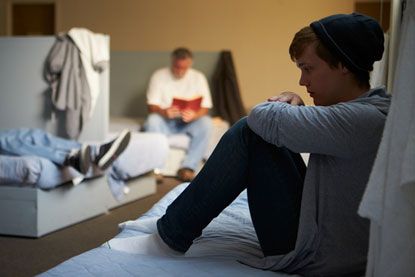
The story began 20 years ago, when the church began operating an interior shelter for a handful of homeless men. One thing led to another, as things so often do, and in February 1999 the church expanded its modest enterprise: It began to operate a second sanctuary outside, on a strip of church-owned property extending into a public sidewalk. It would be "a kind of creche scene," said the pastor, "telling the world that the poor and homeless are welcome and not forgotten in the midst of a world that is deeply concerned with prosperity."
In its petition to the high court, the city explains that it tried to accommodate the efforts of the church to expand its ministry outside. For the better part of two years, a period of discovery ensued. It revealed "an ongoing pattern of anti-social behavior occurring at the overnight encampment on the church steps.
"The church acknowledged having had problems with individuals in its overnight encampment — panhandling, playing loud music, engaging in disruptive behavior and using foul language. According to the church, such problems occur approximately once a week. Despite the frequency of these incidents, the church provides no security or supervision for the individuals in the encampment.
"A representative of the church also acknowledged sanitation problems on the steps of the church resulting from the lack of toilet facilities. If one of the homeless individuals in the outdoor encampment has bathroom needs, that person must either find an all-night toilet or use a small bottle or can which is then emptied. The church representative stated further that if bottles and cans will not suffice, what 'homeless people do is they use newspaper and they fold it up ... and they go put it in the trash.'"
Church wardens cleaned the premises every day, but sporadic complaints continued of littering and panhandling. There was one report of a woman soliciting as a prostitute. Thousands of fastidious shoppers had come to town. Tensions mounted.
Just before Christmas in 2001, city authorities ran out of patience and sought to evict the sidewalk tenants — in the middle of the night. Lawyers for the church went to court. They want to balance God and mammon. The city wants to throw the bums out, but in a nice way. Finally, four months ago the U.S. Court of Appeals for the 2nd Circuit entered a permanent injunction directing the city to leave the mendicants alone. The freeloaders are still there, and the city still wants them moved to a much safer, more sanitary, obviously healthier and practically invisible location somewhere else.
The Circuit Court was not impressed by the city's argument that the church habitat has become a public nuisance. The city has provided "no medical evidence that the conduct endangers or injures anyone's health." Indeed, the city provided no medical evidence that the homeless people who spent the night on church property constituted a health risk to themselves or to the public at large."
To the church, its hospitality is a protected religious activity. To the city, the church's practice of having homeless people sleep outdoors, exposed to the elements, without toilet facilities and personal security, "cannot constitute religious ministry in any meaningful sense." To describe the nightly encampments in terms of "compassion" or "hospitality" is "simply an abuse of English usage."
I come down in the middle of this case. The Fifth Avenue church may have a duty to the homeless. The people of New York have a few rights as well.
(Letters to Mr. Kilpatrick should be sent by e-mail to kilpatjj@aol.com.)
COPYRIGHT 2005 UNIVERSAL PRESS SYNDICATE
This feature may not be reproduced or distributed electronically, in print or otherwise without the written permission of uclick and Universal Press Syndicate.


